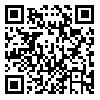Volume 3, Issue 4 (2014)
JCP 2014, 3(4): 509-521 |
Back to browse issues page
1- Department of Plant Pathology, Faculty of Agriculture, Tarbiat Modares University of Tehran, Iran.
Abstract: (4808 Views)
Macrophomina phaseolina is one of the major yield limiting factors of melons in tropical and subtropical regions. For eco-friendly and effective management of the disease, 24 gamma induced mutants from Trichoderma harzianum were evaluated against three isolates of the pathogen representing three geographically different regions viz. Khorasan (isolate 1), Garmsar (isolate 2) and Khuzestan (isolate 3). The isolates of Trichoderma (mutants and wild type) were evaluated against the pathogen in dual culture and through production of volatile and non-volatile inhibitors. Maximum growth inhibition was observed in Th1, Th4, Th15, Th9 and Th22 mutants after three days. In greenhouse evaluation against M. phaseolina (isolate 1) among the inoculated treatments minimum plant infection was observed in Th9 treatment (28% disease reduction) as compared to infected control and among the uninoculated treatments Th1and Th9 mutants resulted in maximum growth of roots and shoots of melon plants as compared to uninfected control. These mutants are introduced as potential candidates against M. Phaseolina. The results proved that gamma-mutagenesis by enhancing the antagonistic properties of T. harzianum 65 can be useful for the biocontrol of soil borne plant pathogens such as Macrophomina phaseolina.
Keywords: Charcoal rot of melon, Improvement biocontrol ability, Gamma-mutagenesis, Trichoderma harzianum
Received: 2013/06/10 | Accepted: 2014/02/22 | Published: 2014/12/1
| Rights and permissions | |
 |
This work is licensed under a Creative Commons Attribution-NonCommercial 4.0 International License. |



